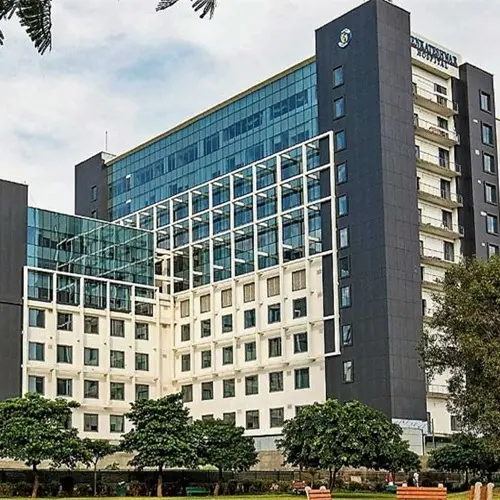Cochlear Implant Surgery cost in India
The Cochlear Implant Surgery cost in India ranges from $14,500 to $22,000 (approximately ₹12,20,000 to ₹18,60,000), making it a cost-effective choice compared to many Western countries where the procedure is significantly more expensive. The overall cost may vary depending on the type of implant used, the hospital selected, the expertise of the surgeon, and whether one or both ears require implantation.
Cost Range of Cochlear Implant Surgery cost in India
This surgery is especially recommended for children born with hearing impairment and adults who have lost their hearing due to illness or injury. The procedure not only helps patients recognize environmental sounds but also improves their ability to understand speech, develop language skills, and participate in daily conversations more confidently. After surgery, patients undergo rehabilitation and speech therapy, which play an important role in adapting to the device and achieving the best possible outcomes.
India is home to world-class ENT specialists, advanced audiology centers, and internationally accredited hospitals, ensuring excellent care throughout the process. With its affordable cost, high success rates, and comprehensive post-surgery support, cochlear implant surgery in India has become a preferred option for patients worldwide seeking a permanent solution to hearing loss.
Get a free cost estimate
Who is a candidate for cochlear implant surgery in India?
Cochlear implant surgery is typically recommended for individuals with severe to profound hearing loss who do not benefit from conventional hearing aids. The following criteria help determine candidacy for this procedure:
Age Group
Children:
- Ideal candidates are children aged 12 months and older with profound bilateral sensorineural hearing loss.
- Early intervention is crucial as it enhances language development, especially if performed during the critical period of speech acquisition (up to 3 years of age).
Adults:
- Suitable for individuals with severe to profound hearing loss in both ears who have limited benefit from hearing aids.
- Adults with post-lingual hearing loss (hearing loss that occurred after developing speech and language) often show better outcomes as they are familiar with sounds and language.
Degree of Hearing Loss
- Candidates typically have severe to profound sensorineural hearing loss in both ears.
- They experience minimal improvement in speech recognition even after consistent use of hearing aids.
Speech and Language Development (in Children)
- Children who demonstrate minimal progress in auditory and speech development with hearing aids are strong candidates.
- Parental commitment to post-surgery rehabilitation and therapy is also an essential factor.
Health Status
- Candidates must be in good general health to undergo surgery.
- There should be no contraindications like active infections, severe psychiatric disorders, or medical conditions that could pose risks during surgery.
Auditory Nerve Function
- The auditory nerve must be functional for the cochlear implant to work effectively, as the device directly stimulates the nerve to send sound signals to the brain.
Commitment to Rehabilitation
- Post-surgery, patients require auditory training and speech therapy to maximize the benefits of the cochlear implant.
- A supportive environment and consistent follow-up with audiologists and speech therapists are essential for successful outcomes.
Evaluation Tests
Before surgery, candidates undergo a series of assessments, including:
- Audiological Tests: To determine the degree of hearing loss.
- CT or MRI Scans: To evaluate the structure of the inner ear and ensure suitability for the implant.
- Speech Perception Tests: To assess speech recognition with and without hearing aids.
- Medical Examination: To rule out conditions that may interfere with surgery.
By fulfilling these criteria, individuals with hearing impairments can significantly improve their auditory and communication abilities through cochlear implant surgery in India.
Types of Cochlear Implant Surgery and Cost
Here is an overview of the common types of Cochlear Implant Surgery along with their approximate cost range in USD:
Types of Cochlear Implant Surgery in India | Cost Range in USD |
Unilateral Cochlear Implant Surgery Involves placing a cochlear implant in one ear, suitable for individuals with profound hearing loss in one ear. | 14500 to 18500 |
Bilateral Cochlear Implant Surgery Implants are placed in both ears simultaneously or sequentially, improving sound localization and speech understanding in noisy environments. | 19000 to 25000 |
Get a free cost estimate
City wise Cost Comparison for Cochlear Implant Surgery in India
City | Cost in USD |
New Delhi / NCR | 13500 to 22000 |
Mumbai | 16500 to 28000 |
Bangalore | 15000 to 28000 |
Chennai | 14500 to 24000 |
Cochlear Implant Surgery Cost in India Inclusions
Surgeon fee, OT charges, anesthesia
Cochlear implant device
Pre-operative outpatient consultations
Routine drugs and consumables required during hospitalization
Pre-anesthesia check up and clearance
Hospital stay and meals as per the package
Cochlear Implant Surgery Cost in India Exclusions
Hotel stay, meals and flights
Extended hospital stay
Post-operative follow-ups and medical management
Treatment for any other underlying medical conditions
Other Factors Affecting Cochlear Implant Surgery Cost in India
Choice of location, doctor and hospital
Pre-existing medical history
Type of surgery
Overall patient status and condition at the time of procedure
Diagnostic Tests Before Cochlear Implant Surgery
Types of Tests For Cochlear Implant Surgery in India | Cost Range in USD |
Audiological Evaluation: This includes pure-tone audiometry, speech audiometry and otoacoustic emission tests to check the current hearing status. | 50 to 100 |
Imaging Studies: This include CT and MRI scan to provide detailed view of the auditory nerve and brainstem, cochlea and inner ear. | 300 to 400 |
Why is India preferred as one of the best countries for cochlear implant surgery?
India is a preferred destination for cochlear implant surgery due to its combination of advanced medical facilities, skilled surgeons, and affordable costs. The country has globally renowned hospitals equipped with state-of-the-art technology, offering success rates comparable to top medical centers worldwide. Indian surgeons are highly experienced, performing thousands of cochlear implant procedures annually, with many trained in advanced techniques from reputed institutions abroad.
The cost of cochlear implant surgery in India ranges from $14,500 to $22,000, significantly lower than in Western countries, where it can exceed $50,000. India also excels in post-surgery rehabilitation, with audiologists and therapists providing comprehensive support for patients to maximize hearing outcomes. Several Indian hospitals are JCI and NABH accredited, ensuring adherence to international quality standards.
Additionally, India is home to advanced cochlear implant programs tailored for both adults and children, with early intervention programs that enhance speech development in young patients. Patients from over 100 countries, including Africa, the Middle East, and Southeast Asia, travel to India annually for cochlear implants, with a notable increase in medical tourists citing cost-effectiveness, high-quality care, and multilingual support services.
Cost Comparison for Cochlear Implant Surgery in India with Other Countries
Country | Cost in USD |
India | 14500 to 22000 |
Turkey | 24000 to 45000 |
UAE | 55000 to 75000 |
USA | 95,000 to 110,000 |
Best Hospitals for Cochlear Implant Surgery in India
FAQs
A cochlear implant is a small electronic device that helps people with severe hearing loss hear better. Unlike a hearing aid, it does not just make sounds louder—it directly stimulates the hearing nerve so the brain can understand sounds.
Cochlear implants are for:
- Children born with severe hearing loss.
- Adults who lost hearing and do not benefit from hearing aids.
- Patients who cannot understand speech even with powerful hearing aids.
The surgery is performed under general anesthesia. The surgeon places the implant behind the ear and connects it to the inner ear (cochlea). The external sound processor is fitted after healing. The procedure usually takes 2–3 hours.
Yes. It is a common and safe procedure in India. Like any surgery, there are small risks such as infection or dizziness, but serious problems are rare when done by experienced surgeons.
The success rate is over 90%. Most patients, especially children, develop good hearing and speech with proper therapy after the implant.
- Highly skilled ENT and cochlear implant surgeons.
- World-class hospitals with advanced technology.
- Affordable treatment compared to the US, UK, or Middle East.
- Specialized rehabilitation and speech therapy programs.
No. The implant is usually activated 2–4 weeks after surgery, once the wound heals. Then, gradual sound training and speech therapy help patients hear and understand better.














